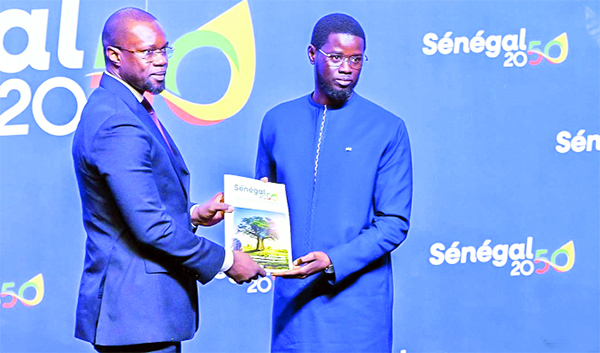New development reference: The Project is Here!

The President of the Republic, Bassirou Diomaye Faye, officially received yesterday at the Cicad, the Vision « Senegal 2050: national transformation agenda », the new reference framework for public policies. The strategic document of the new regime, which replaces the Emerging Senegal Plan (PSE), is divided into four axes and whose implementation will allow, according to its designers, a systemic transformation of the country over the next 25 years.
Exit the Emerging Senegal Plan (PSE) launched in 2014 by President Macky Sall with the ambition for the country to achieve emergence by 2035. The Vision “Senegal 2050: national transformation agenda”, which was officially presented yesterday at the Abdou Diouf International Conference Center in Diamniadio (Cicad), has supplanted this program, in order to bring to life, the “Project” theorized since the Presidential election by the Diomaye-Sonko tandem. « This strategic document lays the foundations of a new era for our country, » noted the President of the Republic, Bassirou Diomaye Faye. Articulated around four strategic axes – one more than the PSE – the new framework aims for a systemic transformation through a new approach. « Vision Senegal 2050: national transformation agenda, reveals the dynamics of a national social pact to build a sovereign, just and prosperous Senegal. This document deeply reflects our ambition to overcome divisions and challenges, and to completely revise the classic patterns of the past that have led to unacceptable stagnation and social regression maintained by a vigorously indexed comfort governance that is strongly rejected by the populations, » said President Faye in his speech.
The river floods: The authorities finally get involved; the Omvs warns
According to President Faye, to reverse the trend and put the country on the path to systemic transformation, the document, the result, of exceptional design work between the government, state services and national experts from the public and private sectors, intends to rely on four strategic axes. « This new national development strategy is an innovative response to the challenges of Senegal’s systemic transformation. It is based on an endogenous, clear, coherent, ambitious and assured vision. This roadmap for the next 25 years, which is being shared today, is the result of collective reflection and is broken down into five-year and ten-year strategies, » he stressed. « It will allow us to adjust and optimize our actions and efforts in real time. Thus, the systemic transformation of Senegal is based on 4 decisive strategic axes, » noted the Head of State.
[themoneytizer id= »124208-2″]
The said axes are: « Good governance and African commitment », « Quality human capital and social equity », « Development and sustainable development » and « Competitive economy » and their implementation should make it possible to « build a sovereign, fair and prosperous Senegal ». This program, which aims, according to the Head of State, to make the country a leading player in the sub-region and a development model for Africa, aims to guarantee well-being and better living for all Senegalese.
Distress Floods: River Senegal Overflows
« This agenda of hope and mobilization is not limited to economic forecasts. Above all, it illustrates the desire to strengthen national cohesion, reduce inequalities and guarantee each citizen a place in the Senegal of the future that is taking shape and that we are building with determination, » he noted, assuring that its success requires the commitment of each Senegalese man and woman.
« Hence my particular attachment to its appropriation, its enrichment and its popularization, » he asserted with clear awareness of the immensity of the task. « The path we are taking is demanding, but is the only one to guarantee our lasting success.
Citizens must be demanding of their governments and each citizen must be demanding of themselves in their contribution to the work of national construction, » outlined President Bassirou Diomaye Faye, as the only way to build « a stronger Senegal, a fairer Senegal and a more prosperous Senegal. »
By Alioune Badara NDIAYE(Correspondant) / abndiaye@lequotidien.sn

